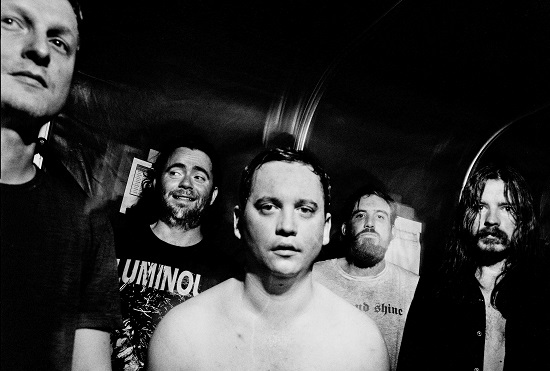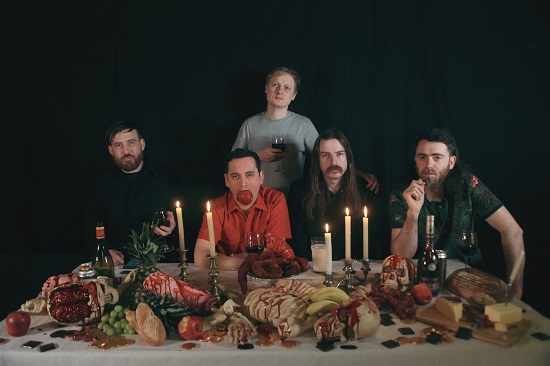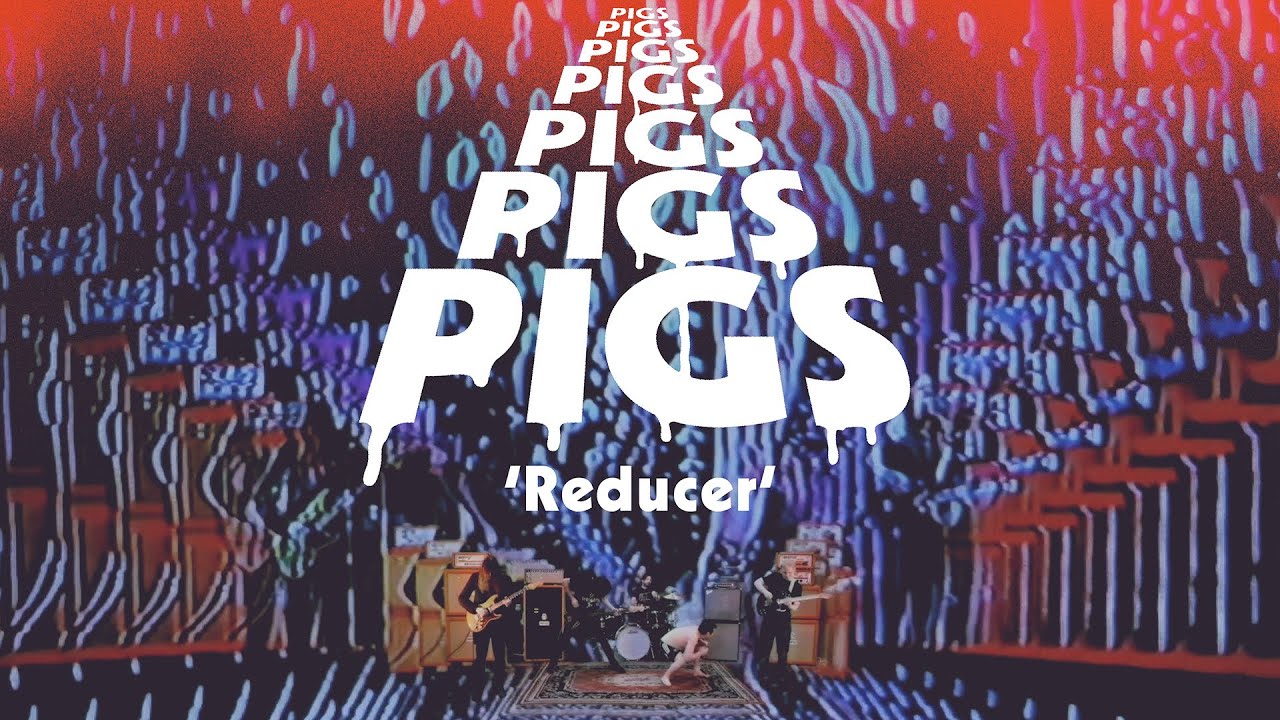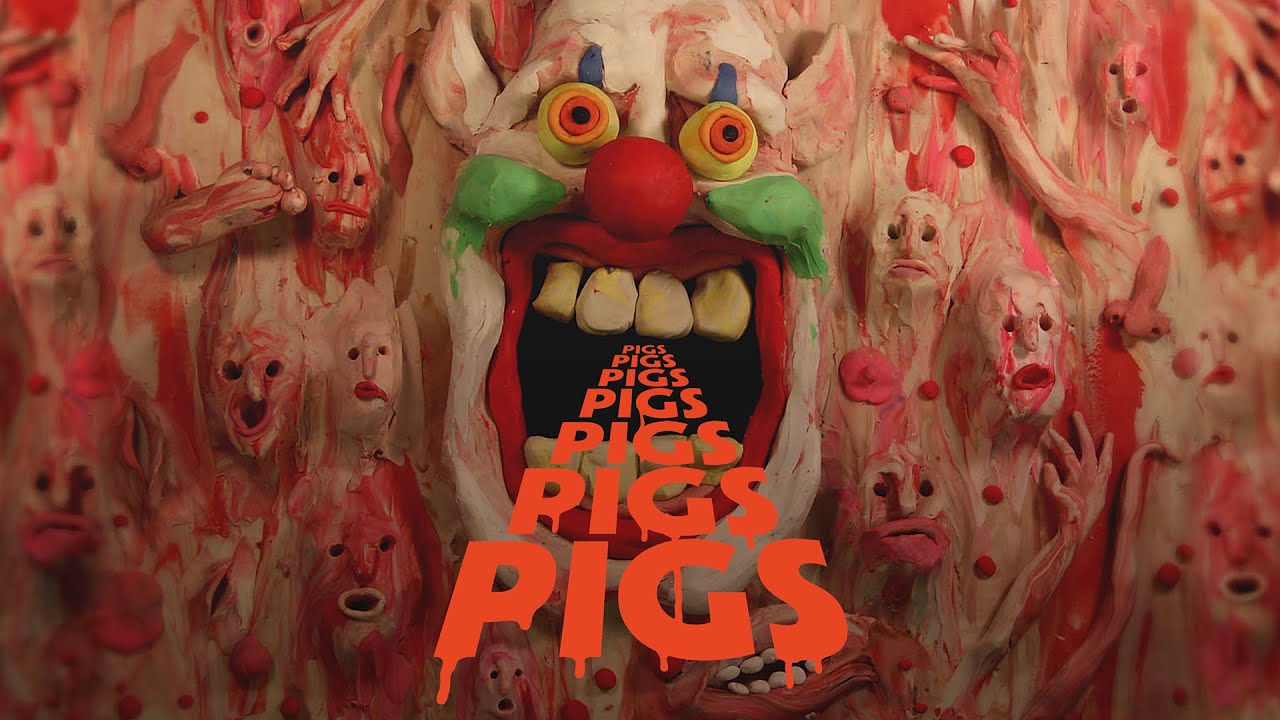Coronavirus-enforced isolation (we speak to the band’s five members via Zoom) has been the only real break for Pigs Pigs Pigs Pigs Pigs Pigs Pigs in a relentless period of touring and recording since 2017’s blistering debut album Feed The Rats. “I would go mad if I stopped,” says Adam Ian Sykes, the band’s guitarist, before moving his laptop camera to show off the Great Escape-style tally marks etched into his bedroom wall, one per day of lockdown.
“I went on a night out last night on GTA 5 and I got really pissed in a casino, so I’m fine,” says bassist John-Michael Hedley.
That work-rate has paid off. Last week their third album in four years Viscerals hit number one in the UK independent record store chart, number two in the UK vinyl charts, and even breached the mainstream album charts at number 67. The last time they all met in person, the band were discussing their plans to take their live show to America this month “which in hindsight was a ridiculous conversation to be having,” says frontman Matt Baty from beneath his newly-grown quarantine moustache. In short, the Pigs are now a band of considerable stature.
In September 2018, they sold out the Scala in London, playing to a crowd of over 1,100, while supporting their second LP King Of Cowards. “We thought we’d half fill it, but it far exceeded our expectations,” Baty continues. “It was nice reading about people’s reactions to King Of Cowards, but the Scala made it all feel real.”
“You come out the back of something like that with so much of a sense of validation,” adds guitarist Sam Grant, who also produces the band from his own Blank Studios in Newcastle. “You could argue that things like that Scala gig are quite instrumental in the eventual outcome of Viscerals, in terms of feeling, ‘We can do this.’"
“It instils that hope that as long as you’re enjoying it yourself, that’s going to continue on for other people,” adds Sykes. “It means you don’t overthink things and trust your instincts.”
Like Feed The Rats and King Of Cowards the band’s new album is equal parts ferocious and fun, able to take itself seriously – they are a band of quite considerable technical ability – and at the same time revel in the inherent pomp and preposterousness of what they play. On Viscerals Baty howls about vomiting flies, kicking the devil "where he needs it", being digested by God, and delivers a camp-horror vignette about a restaurant serving "poison made with the cheapest ingredients possible".
“This is the first band I’ve ever done vocals in,” says Baty who is also the drummer for friend and fellow Tyneside outlier Richard Dawson, “so I suppose in some ways there was a sense of finding my feet on Feed The Rats and King Of Cowards whereas on this one I kind of went into the studio with a bit more confidence, a bit more knowledge of what I was capable of.” In the past, he has spoken about how a childhood wrangling with the more intense and existential images of his Christian upbringing has influenced his writing, most notably in their second LP which was loosely themed around the seven deadly sins. On Viscerals, however, the band utilise that potent material to paint something akin to a Hieronymus Bosch painting, equal parts vivid, ludicrous, terrifying and brilliant.

“I wouldn’t say that in the first instance we lacked confidence,” Grant points out. “It’s not like we’ve been tiptoeing around for seven years, but on any sort of venture you learn on the job.” When they were recording their debut, which took the form of two quarter-hour tracks of crushing, constantly mutating heavy metal sandwiching one shorter, more concentrated blast, they referred to it as “music on a toilet roll – adding and exploring and blindly seeing where we wound up.” King Of Cowards, was more conventionally structured and written in a two-week retreat to the Italian countryside during a break in touring, and saw them delving deeper into “a sense of ‘the song’”. This time around, Grant says, “the independent characters and what each of us is doing has come out more, whether it’s Johnny with his basslines or Adam with his solos. We’re more able to identify what each of us does individually and explore. We’re not reinventing the wheel, it’s good solid rock music, but I found there was more of a vision of, ‘Here’s the road to push the sound down.’”
The Pigs’ upswing in individualism aside, their personalities are likely at the heart of the band’s swift rise to popularity. Their straight-up ability as musicians and performers means they were all but guaranteed to establish themselves within heavy circles, but it’s their playful side, and the way in which they subtly undermine the more macho trappings of heavy rock, that has seen them crossover so remarkably. “I feel like as a group of people we come across as more approachable, people can come and chat to us after we’ve played, we don’t want to lose that, to create some sort of barrier or lose touch with being people doing things in the same way. It’d be nice if someone could look at us and think ‘I can do that’, rather than at some big bulky guy covered in tattoos with long hair.”
Baty’s presence as a frontman is a part of that. He is brilliant onstage, barefoot and most often wearing nothing other than Newcastle United football shorts, roaring, "I love you mummy" as he squats and pounds his chest like a precocious adolescent gorilla. There’s a preposterousness to it all, a vital mix of the ridiculous amongst the sublime that gives it both an added depth and disarms the pretence that accompanies many of their contemporaries; in short, it’s extremely fun to watch. “Rock music, the very early iterations of it anyway, was for everyone. It was celebratory, but then somewhere down the line it got hijacked by this macho aesthetic,” the singer says. “I hope [our music] undermines it, but it wasn’t something that I set out to do intentionally. I just think it’d be a shame if we thought we had to adhere to that imagery to be able to do what we do, and I’m glad we don’t.”
The way the Pigs instil humour and absurdity into their music – Viscerals – also means they can also wield some of the genre’s most common tropes without just aping them. On their first album they named a track ‘Sweet Relief’ after the Black Sabbath classic ‘Sweet Leaf’. “There are certain aspects of what we do that are very derivative,” Baty laughs. “But I’d like to think they’re a bit more of a tongue in cheek reference, rather than copycatting.” That said, to paint Pigs Pigs Pigs Pigs Pigs Pigs Pigs as some sort of parody would be to miss the point. The name is purposely daft, as are many of their lyrics, and that’s what’s drawn in a lot of people who might not otherwise be their way inclined, but there’s no hint of sneer to anything they do. “I think that’s what’s honest about our music, that we allow those parts of us to influence the music and influence the performance,” Baty says.
“A couple of days ago we had a really nice review,” adds Grant, “but the first paragraph alluded to this thing of ‘the name does the job’, that it gives people a ‘semi-ironic enjoyment’ and how it opens a door that might not otherwise be open, and I imagine that there’s probably some truth to that, but it wasn’t ever intended to be a kind of marketable asset. The stupid band name has probably done a few hard yards, but what stands behind it still has to be of a merit.”

Photo: Aida Cortero
Indeed, there is something deeply, properly powerful about the Pigs’ gleeful, over-the-top riffs and howls, particularly when performed live. They create a staggering, swirling and lurching racket that is often trance-like. “It’s basic, but we play really loud,” Grant puts it. “There’s certain sections of the set, you know when you start looping it and it starts to become really hypnotic in a really exciting way and at a really loud volume, and we intersperse that with some riffs that really demand your attention, it’s quite an intoxicating thing to play.”
“I’ve said before that I feel like we live in a really noisy world, and some of the benefits I’ve always experienced from playing really noisy music is it feels like it cancels that noise out," says Baty. "While it’s happening, it’s meditative in a way, because everything sonically is so full on that you don’t have the space be thinking about anything else.”
Perhaps the secret of Pigs Pigs Pigs Pigs Pigs Pigs Pigs’ success is the way in which that energy, combined with a sense of inclusiveness and straight-up musical ability, has followed them every step of the way. “I’d say that as a group we’ve got a canny knack of if we see the opportunity, we take it, but at no point do we expect it,” says Grant. “But as we keep going, so log as there’s a thirst for this world of music, it’s anyone’s guess what happens next.” As the coronavirus enforces a rare chance to take stock after three years of constantly outstripping expectations, perhaps it’s got them wondering just how far things could go.
“I think that’s dangerous,” says Sykes.
“I’m grateful that everything’s still surprising and exciting me,” says Baty. "I would never want any of this to feel commonplace.”
Pigs Pigs Pigs Pigs Pigs Pigs Pigs’ new album Viscerals is out now via Rocket Recordings. You can purchase it here




